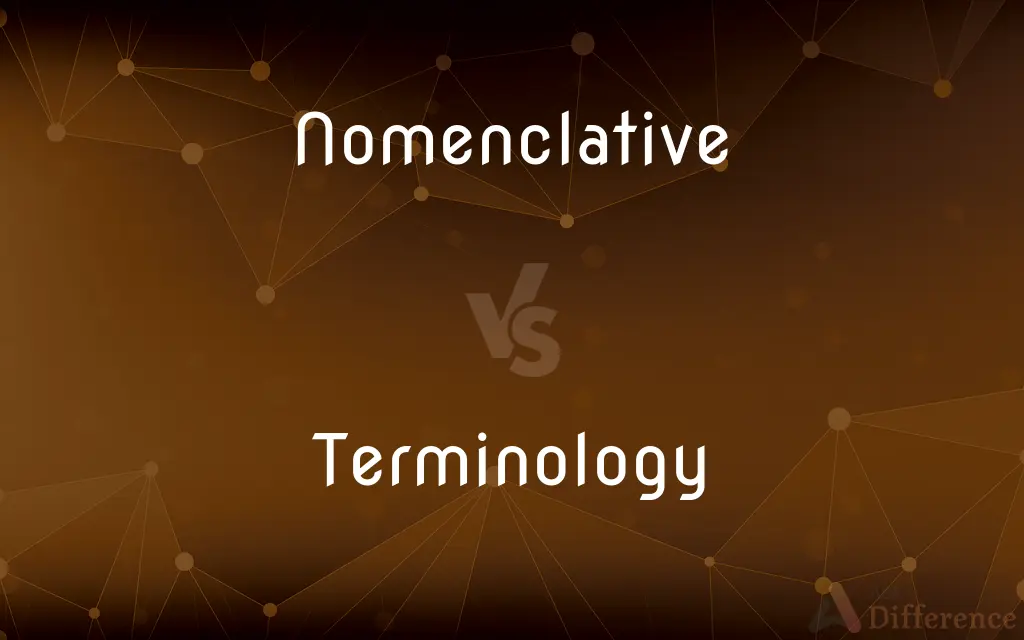Nomenclative vs. Terminology — What's the Difference?
By Tayyaba Rehman & Fiza Rafique — Updated on May 6, 2024
Nomenclative focuses on the system of naming within a specific field, while terminology encompasses all terms and their meanings relevant to a particular subject area.

Difference Between Nomenclative and Terminology
Table of Contents
ADVERTISEMENT
Key Differences
Nomenclative specifically addresses the methods and principles used in naming things within a particular discipline, such as chemistry or botany. On the other hand, terminology refers to the set of terms that are associated with a specific field of study, encompassing not just names but also definitions and usage.
Nomenclative often deals with the creation and standardization of names according to specific rules and conventions. Whereas terminology not only includes these names but also the broader vocabulary used to discuss and describe the field.
In practice, nomenclative helps professionals and academics ensure consistency and clarity in the naming of new discoveries or concepts within a field. Terminology, on the other hand, aids in communication by providing a comprehensive lexicon that includes all relevant terms.
Nomenclative can be seen as a subset of terminology, focusing solely on names and naming conventions. Terminology, however, spans wider, including jargon, technical terms, and specialized vocabulary beyond just names.
Professionals relying on nomenclative often engage in debates and reviews to standardize names as new discoveries occur. In contrast, terminology evolves as the field expands, incorporating new terms and adapting existing ones to new contexts.
ADVERTISEMENT
Comparison Chart
Focus
Naming systems within a field
All terms used in a field including definitions
Scope
Limited to names and naming conventions
Includes all specialized vocabulary
Function
Standardization of names
Facilitation of communication
Primary Users
Taxonomists, scientists in specific fields
Professionals in any specialized field
Relation to the discipline
Subset of terminology, narrower focus
Broad coverage of field-specific language
Compare with Definitions
Nomenclative
Related to the creation and use of names.
Nomenclative consistency is crucial for scientific classification.
Terminology
The words and expressions used in a particular trade.
The terminology of digital marketing evolves rapidly.
Nomenclative
Referring to the principles behind naming conventions.
Nomenclative accuracy is essential for clear communication in science.
Terminology
The study of terms and their use.
She specializes in the terminology of medieval architecture.
Nomenclative
Pertaining to the system of naming in a specific field.
The botanist followed nomenclative rules to name the new species.
Terminology
A set of terms belonging to a particular field or subject.
Understanding the terminology is essential for advanced physics.
Nomenclative
Involving the standardization of terminology in a particular area.
International committees review nomenclative practices regularly.
Terminology
The vocabulary specific to a field of study.
Legal terminology can be challenging for non-lawyers.
Nomenclative
Associated with the taxonomy and naming.
His research focuses on the nomenclative structure within fungal taxonomy.
Terminology
The system of terms used in a particular profession, discipline, or subject area.
Medical terminology includes terms like hypertension.
Nomenclative
Relating to nomenclature.
Terminology
Terminology is a general word for the group of specialized words or meanings relating to a particular field, and also the study of such terms and their use. This is also known as terminology science.
Terminology
The vocabulary of technical terms used in a particular field, subject, science, or art; nomenclature.
Terminology
The study of nomenclature.
Terminology
A treatise on terms, especially those used in a specialised field.
Terminology
The set of terms actually used in any business, art, science, or the like; nomenclature; technical terms.
Terminology
The scientific study of such terms.
Terminology
The doctrine of terms; a theory of terms or appellations; a treatise on terms.
Terminology
The terms actually used in any business, art, science, or the like; nomenclature; technical terms; as, the terminology of chemistry.
The barbarous effect produced by a German structure of sentence, and a terminology altogether new.
Terminology
A system of words used in a particular discipline;
Legal terminology
The language of sociology
Common Curiosities
How does nomenclative differ from terminology?
Nomenclative focuses on naming conventions, whereas terminology includes all specialized terms and definitions within a field.
Why is nomenclative important?
It ensures consistency and clarity in the naming of elements and concepts within a discipline.
How do terminology and nomenclative relate?
Nomenclative is a subset of terminology, specifically dealing with naming.
What is included in terminology?
Terminology encompasses all the terms, definitions, and jargon specific to a field.
What is the importance of terminology in education?
Terminology is crucial in education as it provides the specific language needed to accurately convey and understand concepts within various disciplines.
Can you provide an example of how nomenclative is used in science?
In science, nomenclative is used to name species and elements based on agreed-upon rules, such as those set by the International Code of Botanical Nomenclature.
Is terminology static or dynamic?
Terminology is dynamic; it evolves as new discoveries are made and as fields of study expand and integrate new knowledge.
How can one learn and master terminology in a specialized field?
Mastering terminology in a specialized field typically involves extensive study and practice, often through formal education, reading industry literature, and engaging with community practice.
What is nomenclative?
Nomenclative refers to the system and principles of naming within specific fields.
How does nomenclative affect international collaboration in research?
Nomenclative ensures that scientists across different countries use the same names for elements, species, and concepts, facilitating clear and effective global communication.
What impact does incorrect use of terminology have in professional settings?
Incorrect use of terminology in professional settings can lead to misunderstandings, errors in work, and diminished credibility among peers and clients.
What role does nomenclative play in legal contexts?
In legal contexts, nomenclative plays a limited role, focusing mainly on the precise naming of statutes and legal doctrines to avoid ambiguity.
Are there tools or resources to help with understanding nomenclative and terminology?
Yes, dictionaries, glossaries, and database resources specific to various fields can assist in understanding both nomenclative and terminology.
What challenges do professionals face with terminology in interdisciplinary fields?
In interdisciplinary fields, professionals may face challenges due to varying terminologies from different disciplines, leading to potential miscommunication or misunderstanding.
How is nomenclative developed for new technologies or innovations?
Nomenclative for new technologies or innovations is often developed through consensus within professional groups or regulatory bodies that establish guidelines for naming conventions.
Share Your Discovery

Previous Comparison
Suitcase vs. Bag
Next Comparison
Char vs. VarcharAuthor Spotlight
Written by
Tayyaba RehmanTayyaba Rehman is a distinguished writer, currently serving as a primary contributor to askdifference.com. As a researcher in semantics and etymology, Tayyaba's passion for the complexity of languages and their distinctions has found a perfect home on the platform. Tayyaba delves into the intricacies of language, distinguishing between commonly confused words and phrases, thereby providing clarity for readers worldwide.
Co-written by
Fiza RafiqueFiza Rafique is a skilled content writer at AskDifference.com, where she meticulously refines and enhances written pieces. Drawing from her vast editorial expertise, Fiza ensures clarity, accuracy, and precision in every article. Passionate about language, she continually seeks to elevate the quality of content for readers worldwide.












































